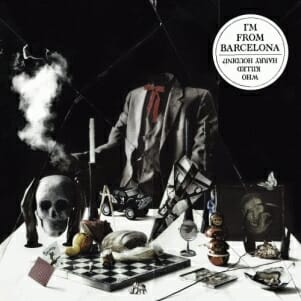I’m From Barcelona: Who Killed Harry Houdini?

Colossal band doesn’t want to grow up
“In my heart, still a kid,” Emanuel Lundgren sings on Who Killed Harry Houdini? the new album by Swedish group I’m From Barcelona. In fact, he sings the line in two different songs.
The first time is on “Mingus,” a contemplation of an old friend who’s settled down in suburbia with a wife, kid and “four-wheel drive.” With horror, Lundgren reacts, “Oh my god.” He sings the line a second time on “Rufus,” a plea to an imaginary 10-foot dog from the singer’s childhood to come and rescue him from the fate glimpsed in the earlier song. He wants to make an escape worthy of Houdini, his childhood idol. He’s not ready yet to be a conventional adult; in his heart he’s still a kid.
It’s a feeling everyone has in the first few months after finally leaving school; it’s a feeling that never completely goes away, that deserves a sound bigger than a conventional rock band. It deserves horns, choirs, synths, multiple guitars and circus percussion, and that’s what it gets from I’m From Barcelona, an ensemble that lists 28 members on its website and often takes most of them on tour. The group is an attempt to grasp the expansive pop ?grandeur of ’60s producers such as Phil Spector and George Martin—not by hiring anonymous session pros, but by having a band large enough to cover every need.
-

-

-

-

-

-

-

-

-

-

-

-

-

-

-

-

-

-

-

-

-

-

-

-

-

-

-

-

-

-

-

-

-

-

-

-

-

-

-

-








































